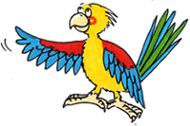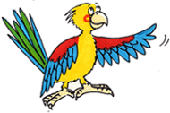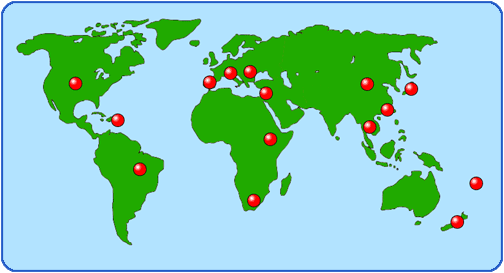|

|
|
|
| |
|
|
|
| |
 | If I said the word, 'sports' to you, what's the first word that comes into your mind? Would it be ... football, Olympics, rugby, athletics, running, training, or something else? Why not try it out on your friends? Record the first thing they say ... is there a pattern with their answers? |
| There are so many different sports. Click on the icons to read some strange descriptions of three well-known ones. Can you work out which sports they are describing? |  |
 Imagine you have to describe another well-known sport to an alien from Pluto - which sport would you choose and how would you describe it? Imagine you have to describe another well-known sport to an alien from Pluto - which sport would you choose and how would you describe it? |
|
|
|
|
|
|
|
|
|
| |
 | Last year, the Rugby Union World Cup was held in Sydney, Australia. Twenty teams from all over the world took part. The table shows how far each team travelled to reach the World Cup but it is not complete! |
A
Team/Country |
B
City |
C
Total distance travelled (rounded off to the nearest hundred kilometres) |
D
Who travelled the furthest? |
| Australia |
Sydney |
0 |
20th |
| Argentina |
Buenos Aires |
|
|
| Ireland |
Dublin |
|
|
| Namibia |
N/A |
11,100 |
|
| Romania |
Bucharest |
|
|
| Scotland |
N/A |
17,200 |
|
| France |
N/A |
16,900 |
|
| Fiji |
Nandi |
|
|
| Japan |
Tokyo |
|
|
| USA |
New York |
|
|
| South Africa |
Durban |
|
|
| England |
London |
|
|
| Samoa |
N/A |
4,300 |
|
| Georgia |
Tbilisi |
|
|
| Uruguay |
Montevideo |
|
|
| New Zealand |
Wellington |
|
|
| Wales |
N/A |
17,100 |
|
| Italy |
Rome |
|
|
| Canada |
Vancouver |
|
|
| Tonga |
N/A |
3,400 |
|
To finish the table:
- Click here to print out the table.
- Visit www.indo.com/distance/. On the webpage, type in the first box the city and country name (for instance, Buenos Aires, Argentina for the first one) for each team, and type in Sydney, Australia in the second box. Click on 'look it up' to get your answer each time.
- Write down the distances in kilometres in column C, rounding them off to the nearest hundred.
- In column D, write 1 for the team that travelled the longest distance, 2 for the team that travelled the second longest distance, and so on.
|  |
 |  Click on the rugby ball to see if you were right! Click on the rugby ball to see if you were right! |
|  Some teams not only travelled a long distance to Australia, but they also went through many 'time zones'. For instance, the England team went through ten time zones, so that they were ten hours ahead of their watches and clocks when they arrived in Australia. But they did come back home as World Cup winners! To find out more about time zones, go to www.globaleye.org.uk/primary_summer2002/eyeon/index.html Some teams not only travelled a long distance to Australia, but they also went through many 'time zones'. For instance, the England team went through ten time zones, so that they were ten hours ahead of their watches and clocks when they arrived in Australia. But they did come back home as World Cup winners! To find out more about time zones, go to www.globaleye.org.uk/primary_summer2002/eyeon/index.html |
 | Other countries don't play or don't like rugby - they have their own favourite sports and pastimes. Click on the hotspots on the map to see which sports are the most popular in different places. |

|
|
|
|
|
|
|
|
|
|
|
 |
|
 |
|
|

